RANKED #1 MOBILE IV SERVICES IN COLORADO
CALL US NOW! (720) 575-0973
Hangover 101: How To Cure A Hangover

Last night's party was great, but today you are feeling it and paying the price. The hangover is kicking in full force and you just want a little relief. Although there are things you can do to relieve the pain and recover, the best hangover cure is rest and time.
If you had taken steps last night, you might have avoided this morning's pain, but it's too late now. Our goal is to reduce the negative effects of alcohol for now. When you counteract nausea, weakness, and headache in the most practical and healthy ways, they will go away. This includes resting your system, drinking water to rehydrate your body, and replacing the vitamins you lost.
Taking steps to prevent and reduce hangover symptoms can help you enjoy your evening without worrying about the morning after.
Ways To "Cure" A Hangover
Your best option is to find a way to get some relief from your symptoms since you can't turn back the clock. There is no magic cure for a hangover, but doing one or a combination of the following might help you feel better:
- Boost your nutrients: The effects of a hangover may be reduced by vitamins and minerals. According to one study, taking 1,200 mg of vitamin B6 before, during, and after drinking minimized hangover symptoms. Through IV therapy, you can quickly replenish nutrients in your body. A popular hangover remedy is the Myers' Cocktail. It is made with B complex, B12, saline, vitamin C, magnesium, zinc, and glutathione, and has been shown to reduce fatigue, rehydrate the body and boost the immune system.
- Take medicine: After an overindulged night, popping a pain-relieving pill, such as aspirin or ibuprofen, can help you feel more relaxed. Choose your medication carefully. As a result of the potential for liver damage, it is not recommended to take Acetaminophen (aka Tylenol) after drinking. Ibuprofen, aspirin, or naproxen are better choices because they help reduce inflammation in the body. An antacid can provide relief for nausea or indigestion, too. Our Myer’s Cocktail for hangover can alleviate nausea and pain associated with being hungover.
- Drink water or sports drinks: Studies have shown that electrolyte levels among hungover and non-hungover people are pretty similar, but it's still important to keep your body hydrated after a hangover. Stay hydrated all day long with plain water or try sports drinks or coconut water for an extra boost. It's especially important to drink water or other hydrating fluids if you've had vomiting or diarrhea as a result of your hangover, since both can make you more dehydrated. If you are having trouble keeping fluids down, give us a call for a mobile IV treatment.
- Sleep it off: Go ahead and go back to bed when you have a hangover if that's all you want to do. The best cure for a hangover is time, so if you can get to sleep and sleep through the night, you might feel better the next morning.
- Eat something: It is not advisable to eat greasy foods to relieve hangover symptoms. Eating bland food will help you replenish your nutrients and will not upset your stomach. A BRAT diet is the best choice when you're hungover. These foods include bananas, rice, applesauce, and toast. They are easy on the stomach, help restore blood sugar levels, and don't cause nausea.
- Skip the hair of the dog: According to some people, the best way to cure a hangover is to drink more. The phrase "the hair of the dog" comes from the belief that drinking a potion containing the hair of a rabid dog would cure rabies. You can stay buzzed the morning after by drinking another beer, a mimosa or a bloody Mary, which will temporarily dull your symptoms. However, it won't help with the hangover and can often make your symptoms much worse.
How To Prevent A Hangover In The First Place
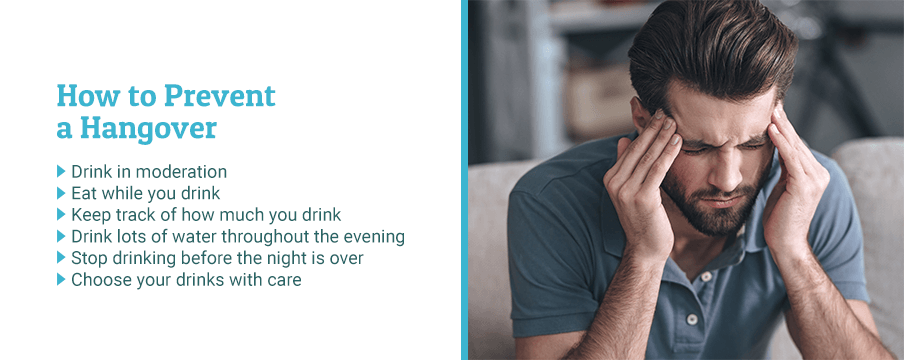
Even though there is no surefire way to cure a hangover, there is a surefire way to prevent one - don't drink alcohol at all! There will be times when you do want to celebrate a milestone or an achievement with a drink or two. However, celebrations do not have to translate into misery the next day. You can do a few things to prevent or reduce the symptoms of a hangover.
- Drink in moderation: If you drink in moderation, you're less likely to experience physical hangover symptoms the next day. Women should not drink more than one drink a day, and men should not drink more than two. After having three drinks in a night, women may experience symptoms of a hangover; whereas, men may experience symptoms after five or more drinks. Some "drinks" are actually more than one, depending on their size and alcohol content. An "alcoholic beverage" is a five-ounce pour of wine, a 1.5-ounce shot of liquor or a 12-ounce bottle of 5% beer.
- Eat while you drink: If you drink on a full stomach, your body will absorb alcohol at a slower rate. If you can, eat before you start drinking to reduce the effects of a hangover the next morning. Eating food while you drink is your next best option. Consider ordering a meal along with a beer or snacking on cheese while drinking wine.
- Keep track of how much you drink: It's easy to lose track of how much alcohol you've consumed when out with friends or at a party. That's especially true if you and your friends are taking turns buying rounds. You can keep track of your drinks by ordering bottles or cans and keeping them on the table as you go. You could also open a tab at the bar for yourself and ask the bartender what your order count is whenever you go up to order. If you are going to a party where it’s customary to BYOB, bring along the exact amount you want to drink, such as two bottles of beer. Having finished your drinks, you know you're done for the night.
- Drink lots of water throughout the evening: Drinking water or other non-alcoholic beverages throughout the evening can help you avoid a hangover in a few ways. In order to stay hydrated, alternate a glass of wine, beer, or spirits with a glass of water. Secondly, having water or a soft drink after each alcoholic beverage makes you drink less. When you drink two glasses of water in between, you can end up having just two beers instead of four.
- Stop drinking before the night is over: Alcohol takes a while to be processed by your body. If you keep drinking past last call, you're more likely to feel hungover the next day than if you stop drinking at 11 p.m. Your liver metabolizes an ounce of alcohol in about an hour. Allowing your body plenty of time to metabolize the alcohol you've consumed will ensure you feel better tomorrow.
- Choose your drinks with care: Isn't a drink just a drink? Not when it comes to hangovers. There are some drinks that contain more congeners than others, for example, whiskey, red wine, and brandy. A congener is a chemical compound that can break down in the body into toxic chemicals such as formic acid and formaldehyde. They are known for making hangovers worse. Stick with light-colored spirits, such as vodka and gin, as well as light-colored beer and wine for a more comfortable morning after.
What Causes a Hangover in the First Place?
If hangovers were caused by one thing, they would be far easier to treat or avoid in the first place. The day after a big night out can be a bit of a challenge if you're suffering from a hangover, which can be caused by a variety of factors. Hangovers are caused by alcohol. That's the most important thing to understand about them. You only tell people that you've got a hangover if you've recently consumed alcohol. You can feel tired, nauseous, and worn out for a variety of reasons.

A hangover is often caused by a combination of the various effects alcohol has on the body. Among the consequences of excessive drinking are:
- Low blood sugar: As a result of drinking alcohol, your body produces more insulin. Blood sugar levels can rise over time as a result of alcohol's effects on your insulin levels and the effectiveness of insulin. Alcohol tends to lower blood sugar levels short-term. Feeling hungover is associated with feeling shaky, weak, and tired due to a drop in blood sugar levels.
- Inflammation: An inflammatory response can also be a cause of a hangover. You produce cytokines in response to an inflammatory response. However, some cytokines cause inflammation. Drinking is associated with a higher production of pro-inflammatory cytokines in the body. As a result of alcohol's inflammatory effects, anti-inflammatories, such as ibuprofen and B vitamins, help to minimize hangover symptoms.
- Irritation of the digestive system: In the event that you experience stomach or gastrointestinal upset after a night of heavy drinking, it's probably the alcohol's fault. When you drink alcohol, your stomach produces more acid, which can cause pain. Alcohol may also cause food to remain in your stomach for longer, resulting in discomfort.
- Dehydration: As a diuretic, alcohol inadvertently dehydrates you, because it makes you pee more frequently. Your body excretes 10 ml of urine for every gram of alcohol you consume. Your body is more likely to become dehydrated when you pee a lot. Dehydration can make you feel dizzy, thirsty, and give you a headache.
- Sleep disruption: When you drink alcohol, you might feel sleepy, but the quality of your sleep is also affected. You fall into a deep sleep when you drink a lot of alcohol, but you are prevented from reaching the rapid-eye-movement (REM) stage of sleep. It is during this stage that you are most rested. If you don't get enough sleep, you may feel groggy and tired the next morning.
- Vasodilation: Vasodilation refers to the process by which alcohol makes your blood vessels wider, so that more blood flows through them. This can cause headaches. Some migraine sufferers may also notice that drinking triggers a migraine the next day.
Hangover Symptoms and What Makes Some Hangovers Worse Than Others
What are the signs of a hangover? If you drank the night before and wake up feeling bad, you probably have a hangover and not a stomach bug. Hanovers usually don't begin until the day after you drink, because they begin when your blood alcohol content is near zero.
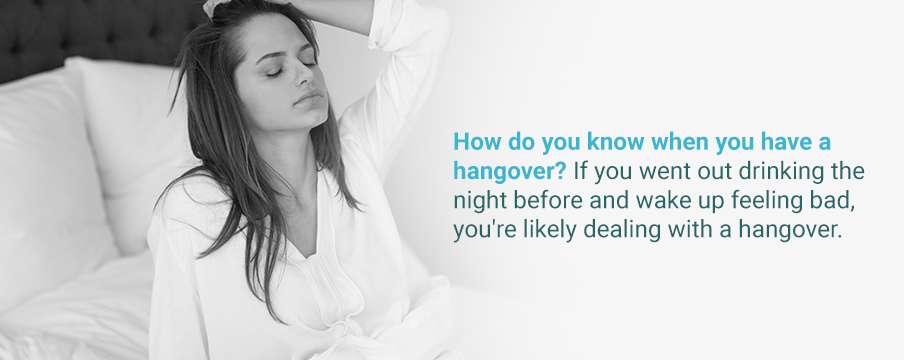
A hangover is characterized by the following symptoms:
- Experiencing nausea and vomiting
- Experiencing fatigue
- Feelings of thirst or dry mouth
- Shakiness
- Sleeping poorly the night before
- Concentration problems
- Anxiety or irritability
- Dizziness
- Sound and light sensitivity
- Headache
- Muscle aches
- Rapid heartbeat
There are some hangovers that are worse than others. If you had a bottle of red wine the night before, you might wake up the next morning with a sore throat, an upset stomach, and a pounding headache. While you might wake up the next day with a mild headache after you drink a bottle of white wine. How you feel after consuming a drink can affect the type of hangover you experience.
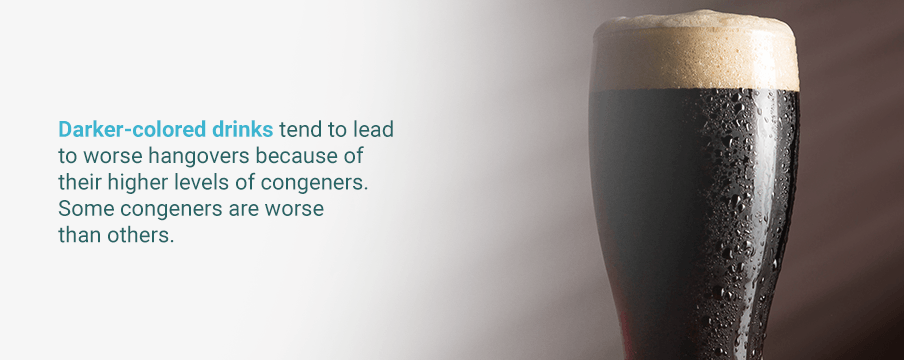
The higher levels of congeners in darker drinks tend to cause worse hangovers. Some congeners are more harmful than others. Methanol, for example, tends to remain in the body long after other alcohol-related compounds have been eliminated. The best drinks for a hangover tend to be whiskey and red wine, since both contain high levels of methanol.
Some people are also more prone to hangovers than others. It is possible to be hungover the day after a big party depending on your age, sex, and genetic makeup. It is more likely that you will experience symptoms after a night of drinking if you are older.
It is also possible that women are more likely to experience hangover symptoms than men. Researchers asked more than 1,200 undergraduates to rate how they experienced 13 hangover symptoms. The symptoms were reported by female respondents to be worse than those reported by their male counterparts.
Women might have a worse hangover than men for a few reasons. The tendency for women to weigh less and to have less body water than men can make them more susceptible to the effects and after-effects of alcohol.
Genetics can also influence the severity of a hangover due to how the body processes alcohol. People from Japan, China, or Korea have a genetic mutation that makes them more likely to be intolerant to alcohol than people from other parts of the world. Alcohol produces acetaldehyde, which is converted to acetic acid by aldehyde dehydrogenase 2 (ALDH2). The ALDH2 enzyme is frequently inactive or less active in people from East Asia due to a mutation. Acetaldehyde builds up in the blood when the enzyme fails to do its job, making hangover symptoms worse. Skin that turns red after drinking alcohol is a common sign of alcohol intolerance.
Should You See a Doctor About a Hangover?
Hangovers can seem like an emergency that requires medical attention, but they generally resolve on their own within 24 hours. However, there are times when your symptoms seem severe enough to warrant a doctor's visit. If you experience symptoms almost every day or experience hangovers fairly frequently, you might be concerned.
Hangover symptoms that occur more than just occasionally may cause you to worry about the overall effects of alcohol. If you experience symptoms often enough that you are unable to work or feel your overall quality of life has decreased, you might want to see a doctor. With the help of a medical professional, you can reduce the amount of alcohol you consume or stop drinking altogether.
In some cases, drinking too much alcohol can result in an emergency. Alcohol poisoning is different from a hangover. This is a serious issue that requires medical attention immediately. A person suffering from alcohol poisoning may exhibit the following symptoms:
- Disorientation or confusion
- Breathing that is irregular or very slow
- Seizures
- Losing consciousness and not being able to regain it
- Skin that is excessively pale or blue
- Very low body temperature
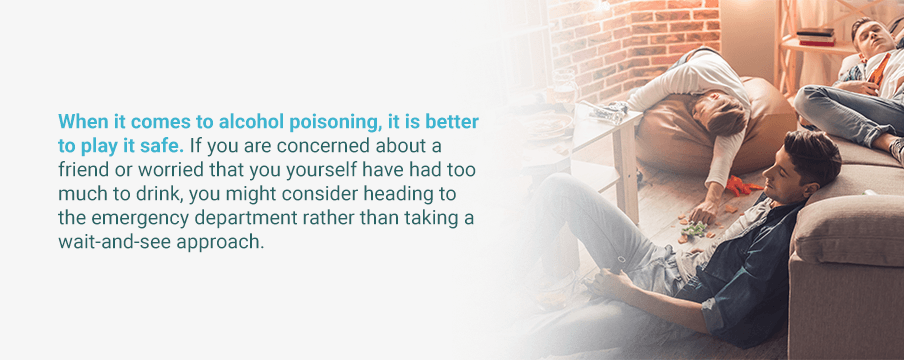
It is always better to be safe when it comes to alcohol poisoning. You might want to go to the emergency room rather than taking a wait-and-see approach if you are concerned about a friend or concerned that you have had too much to drink. A medical professional can give you the appropriate treatment and potentially save your life.
Get Help for Your Hangover Symptoms
Have you had too much to drink last night? Don't waste your entire day wallowing in misery. We offer in-home IV therapy at Mobile IV Colorado to help you get back on your feet. To help you recover from hangover symptoms and boost your immune system, we provide supervised IVs such as the Myers cocktail. To get the vitamins and minerals you need to bounce back, you don't have to go to the hospital.
As soon as you call, a registered nurse or paramedic from our team will get to know you and your needs, take a look at your medical history, and recommend an appropriate treatment for you. You can get the IV treatment for your hangover within an hour if you live within our service area, which includes locations throughout Colorado.
When you have a hangover, things are tough enough. In-home IV therapy makes things a little easier.
Get in touch with us today to learn more about your options and how we can help relieve your symptoms.
If you think you may have a medical emergency, immediately call your doctor or dial 911.
This website is not intended to provide medical advice. It is only for informational purposes. It is not aimed to be a substitute for professional medical advice, diagnosis, or treatment. Never seek treatment based on something you read on the internet and disregard professional medical advice. These statements have not been evaluated by the Food and Drug Administration.
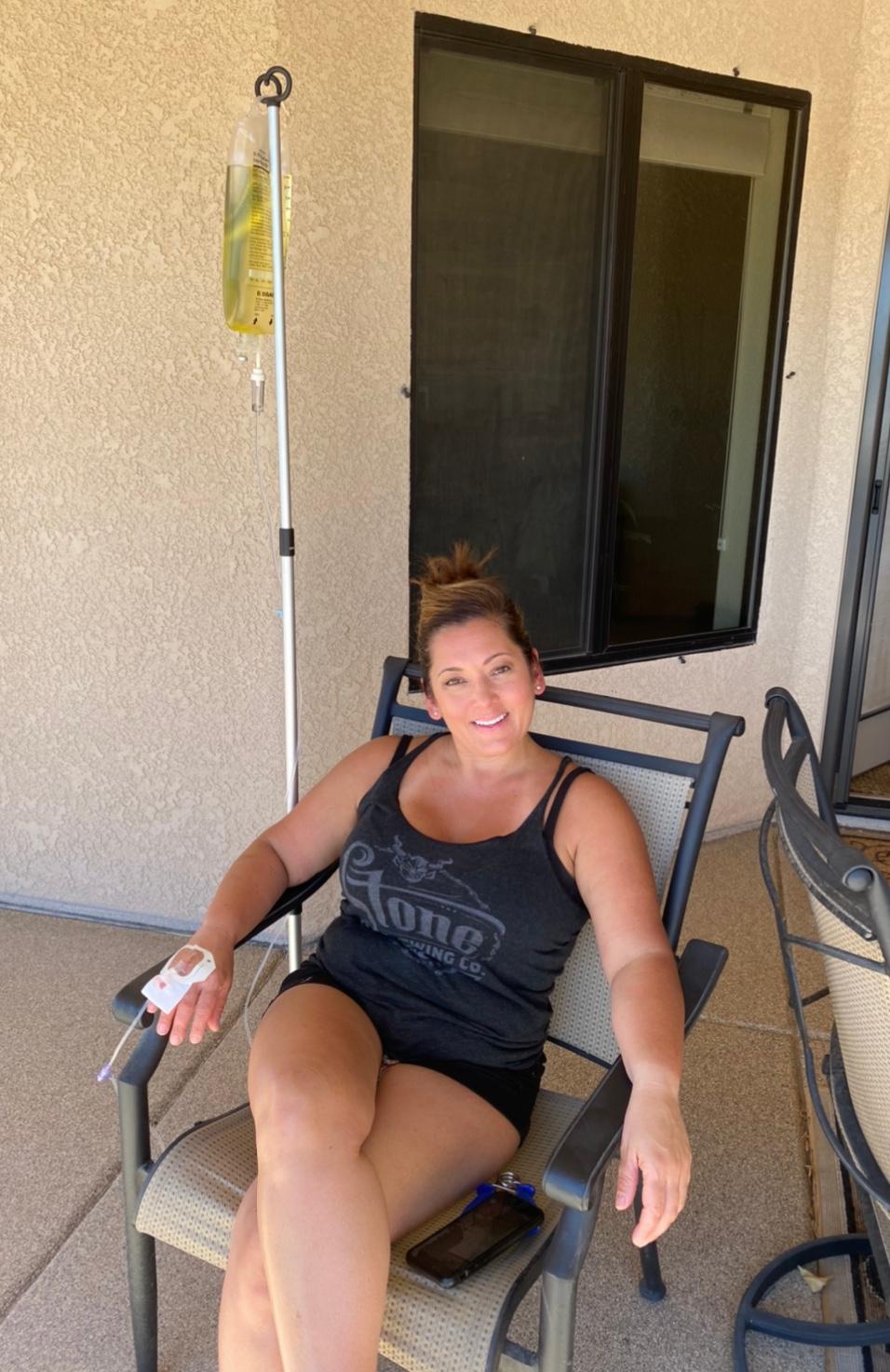
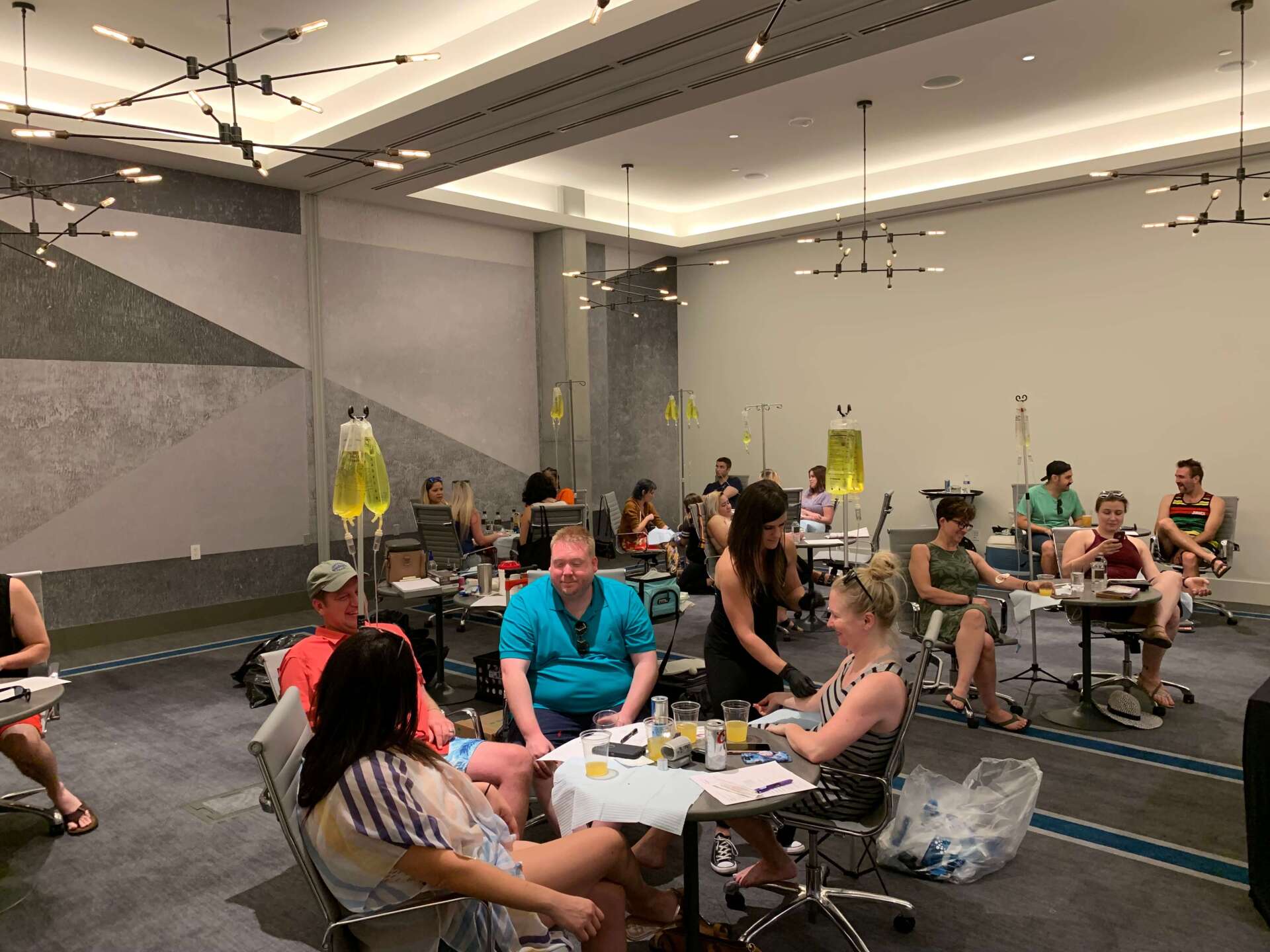
© 2023 Mobile IV Colorado All rights reserved Powered by OMG Marketing


